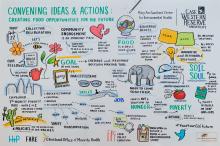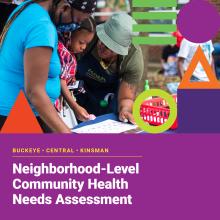Overview
The Swetland Center’s research investigates environmental determinants of health inequities with the goal of translating our findings into policies, practices, and relationships that promote community and population health. Our solutions-oriented research agenda is guided by community-engaged approaches that seek to uncover and dismantle the role of structural racism in creating and sustaining environmental health inequities. We use a team-based approach to study, translate, and share our research to ensure findings are relevant and actionable. The center’s environmental health research program is organized into three areas of focus.
Food systems are complex and acutely connected to human health. They include all the steps involved in growing, distributing, processing, making, and eating food. Throughout this process, there are many intersections with environmental health, such as exposure to pesticides in agricultural practices or access to healthy foods in neighborhoods. The Swetland Center has an expansive research agenda focused on examining how changes can be made to food systems to transform outcomes related to food security, economic opportunity, and health equity in areas experiencing food apartheid. This action-oriented research is conducted in partnership with community residents, community organizations, and business and government partners who are leading innovative community-driven food justice initiatives to root and grow a local food system that works for Black, Latino/a/x, Asian, and Indigenous communities.
Examples of the Center's Food Systems and Health Equity Research
- Nourishing Power Network Study
- Modeling the Future of Food in Your Neighborhood Study*
- Future of Food in Your Neighborhood Study*
*Indicates historical research
Nutrition equity was defined by our collaborative research partners as having freedom, agency, and dignity in food traditions resulting in holistic health for people and communities. The Swetland Center is at the forefront of providing infrastructure to scale policy, systems, and environmental interventions that are scientifically proven to advance nutrition equity, such as nutrition incentive programs, healthy food retail initiatives, and farm-to-school programming. Through the creation of technology, toolkits, and infrastructure, our team is supporting the dissemination and implementation of nutrition equity interventions in diverse urban and rural settings locally, throughout Ohio, and nationally. These initiatives occur in partnership with implementation partners, such as SNAP-Ed, farmers’ market networks, and health departments.
Examples of the Center's Dissemination and Implementation Science for Nutrition Equity
- Building Capacity for Obesity Prevention/PSE READI
- FM Tracks
- FM Engage
- FreshLink Ambassador Technical Assistance*
- Produce Perks Evaluation*
*Indicates historical research
Environmental exposures including those experienced day-to-day in the places where we live, work, play, and pray as well as acute crises (e.g., COVID-19, disasters, climate change) shape health opportunities. Not everyone experiences these environmental exposures in the same way because of policies that segregate society based on social positions related to race, class, ethnicity, age, gender, and their intersections. Analysis of these exposures reveals deeply rooted environmental injustices and reinforces the need for environmental supports, such as access to parks and green space, clean air and water, grocery stores, healthy homes, and safe schools. The Swetland Center is committed to responsive research to describe environmental exposures objectively and systematically within built, natural, social, and physical settings. We employ a collaborative approach to this research by partnering with those most affected by environmental exposures as well as those involved in mitigation strategies with the end goal of providing evidence to inform policies and practices designed to advance in environmental justice.
Examples of the Center's Responsive Environmental Health Research
• Neighborhood Community Health Needs Assessments
• East Palestine State of the Science Study
• COVID-19 Childcare Study*
*Indicates historical research
Cleveland was the “silicon valley” of the industrial revolution leading the nation’s manufacturing industry. Like other Rust Belt cities, this manufacturing focus resulted in economic peaks and valleys as well as increased exposure to pollutants that manifest in environmental health inequities. The Swetland Center has been at the forefront of air quality research through our healthy homes initiatives. Early in the Swetland's history, the center demonstrated that remediation of mold and dampness in housing could significantly decrease the morbidity of asthma in children living in such environments. Subsequently, it has been a leader in demonstrating the clinical value, e.g. decreasing hospitalizations, by addressing the environmental triggers in the homes of asthmatics. The Center continues to be part of a national effort to include environmental and case management home visits within the standard of medical care and funding.




